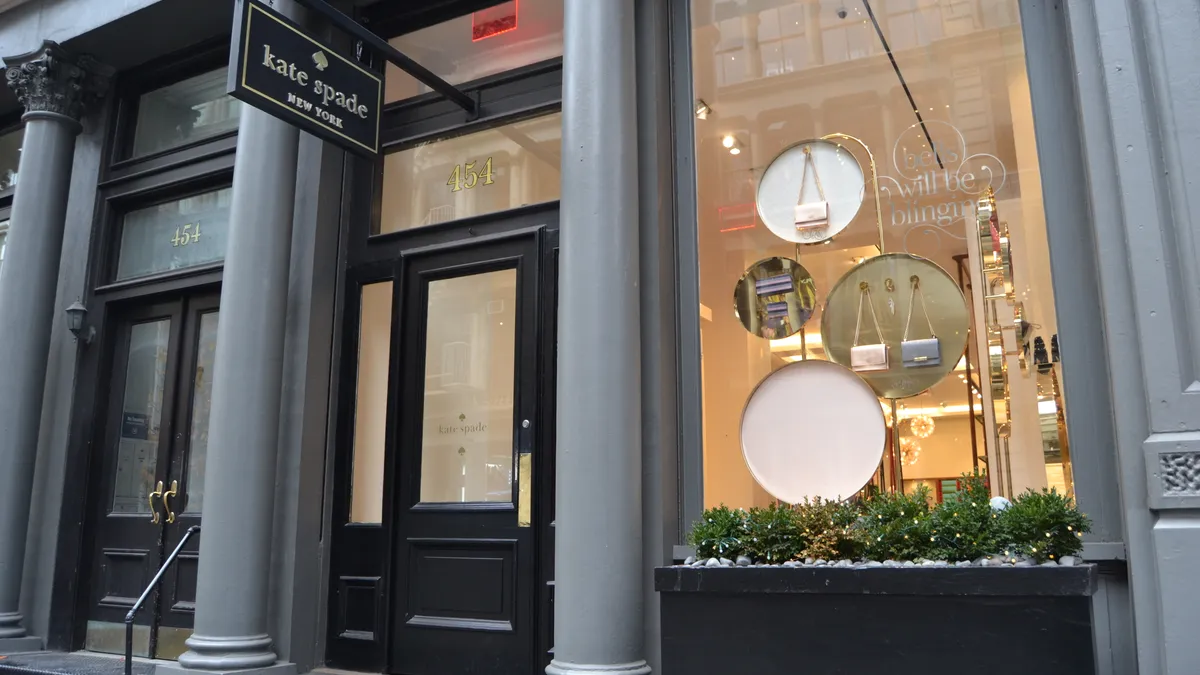Dive Brief:
-
Tapestry on Wednesday announced that Board Chairman Jide Zeitlin was named CEO, replacing Victor Luis effective immediately. Luis is leaving the company and its board, and Zeitlin remains as chairman, according to a company press release. Board member Susan Kropf has been named lead independent director.
-
Zeitlin has more than 30 years of global financial and operational experience and has been on Tapestry's board for more than a decade, the company said. His objective will be "creating long-term sustainable growth" and the search for a new CEO will come "at the appropriate time," according to the release.
-
The shift comes after a letdown at the company's Kate Spade brand in its most recent quarter. Net company sales rose 2% to $1.51 billion, and 6% at Kate Spade to $332 million. But the brand's global comps tumbled 6%, including a positive impact of some 600 basis points from global e-commerce, according to an August press release.
Dive Insight:
The fortunes at Tapestry have been dependent on a turning point at the Kate Spade brand that has failed to materialize. The company renamed itself two years ago in light of its acquisitions of Stuart Weitzman in 2015 and Kate Spade in 2017, which meant running a stable of brands beyond Coach.
But Kate Spade, for which the company paid $2.4 billion, hasn't delivered the way Coach did in its own turnaround. Roxanne Meyer, managing director at MKM Partners, last month called Kate Spade "a 'show me' story."
"Our Buy rating for [Tapestry] was predicated on an inflection at Kate Spade, beginning in 4Q19, as the key catalyst, though we also assumed continued execution and momentum at Coach as well as incremental operational synergies," Meyer said in an Aug. 16 client note emailed to Retail Dive, noting concerns "that Kate Spade's outlook reflects a deterioration of trends that may take several quarters or more to repair."
Wells Fargo analysts led by Ike Boruchow last month similarly pinned their concerns on the brand's disappointing trajectory, noting in emailed comments that, as in the past six to nine months, "the sole issue lies with KATE," in light of misses on revenue and margins.
As it has mostly successfully done at Coach, which was restored from a tired brand dependent on discounts to a luxury label, Tapestry had been working to freshen up Kate Spade merchandise in order to reduce promotions and attract younger, wealthier customers. It had been delivering good results last year, but trouble emerged over the holidays.
In light of ongoing struggles, executives last month noted that they're easing up on their acquisition strategy, "something investors were clearly happy to hear given the lingering issues at KATE," Boruchow said. But Kropf in a statement on Wednesday affirmed the company's dedication to its "tapestry" approach.
"The Board remains committed to Tapestry's multi-brand model, while recognizing the need to sharpen our focus on execution," she said. "Given the continued strength and momentum at Coach — the largest brand at Tapestry — our top priority remains driving significantly improved performance at our acquired brands."















